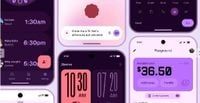Google is set to unveil its latest Android design language, dubbed Material 3 Expressive, at the upcoming Google I/O developer conference later this month. This announcement follows an accidental reveal on May 5, 2025, where details were published in a now-deleted blog post, as reported by 9to5Google.
The new design system marks an evolution from the existing Material 3, which was introduced in 2021 as part of the Material You initiative. The updated framework aims to create interfaces that "connect with people on an emotional level," focusing on usability and aesthetic appeal. According to the leaked blog post, the redesign is the "most researched" update to date, having undergone 46 rounds of design and research involving over 18,000 participants.
Material 3 Expressive emphasizes a bold use of color, shape, and motion to enhance user experience. Google notes that this type of expressive design not only improves usability but also helps users, particularly older adults, navigate apps more easily. The company claims that users can identify key interface elements up to four times faster with the new design compared to the existing Material 3.
As part of its research, Google examined how users interacted with various design elements, including attention focus, reaction to different aesthetics, and the effectiveness of interface components. For instance, the study assessed aspects like the optimal size for buttons to improve tap response times without cluttering the interface. The findings suggest that the new design will help level the playing field for users of all ages, allowing those over 45 to spot interface elements just as quickly as younger users.
Google's commitment to enhancing user experience is evident in its intention to share files and alpha code during the I/O conference, enabling developers to experiment with the changes ahead of a public release. The session titled "Build Next-Level UX with Material 3 Expressive" will provide insights into utilizing new emotional design patterns to boost engagement and usability.
In addition to the overarching redesign, reports indicate that Google is planning to roll out various changes across Android's user interface. This includes redesigned status bar icons, a new clock font, and a revamped quick settings menu. These updates, along with the new Material 3 Expressive design, are expected to significantly enhance the overall Android experience.
While details surrounding the specifics of Material 3 Expressive remain somewhat vague, the focus on emotional connection and user-centric design is clear. Google has recognized the importance of creating interfaces that resonate with users, which could lead to a more enjoyable and efficient interaction with Android devices.
As anticipation builds for the Google I/O conference, developers and users alike are eager to see how these changes will manifest in their daily interactions with Android. The integration of user feedback into the design process highlights a shift towards a more inclusive and accessible digital environment.
In conclusion, Google’s unveiling of Material 3 Expressive represents a significant step forward in the evolution of its design philosophy. By prioritizing emotional connections and usability, Google aims to create a more engaging and user-friendly experience for all Android users.

